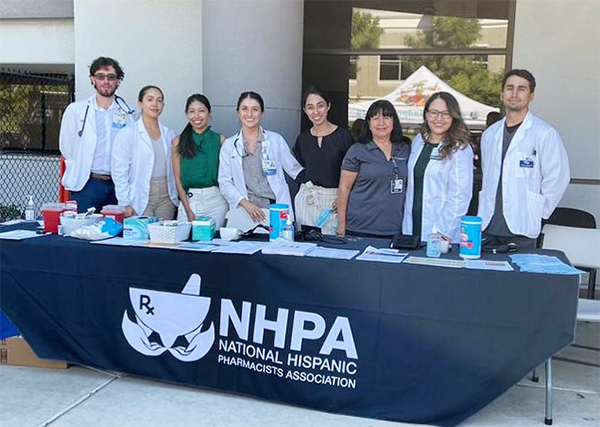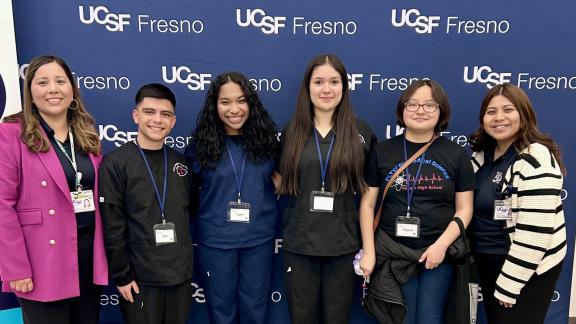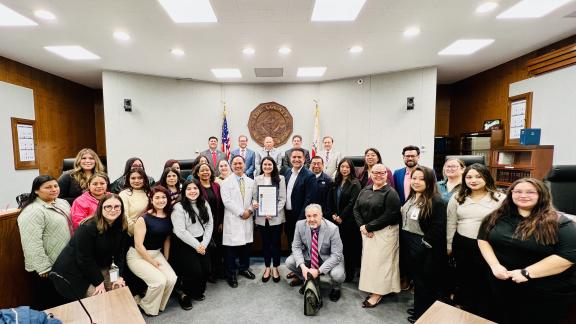
UCSF San Joaquin Valley Program in Medical Education (SJV PRIME) students and the National Hispanic Pharmacist Association held free blood pressure and glucose checks at the Mexican Consulate in Fresno, serving dozens of people from September to December in 2022.
SJV PRIME student Vanessa Mora came up with the idea to work with the Mexican Consulate as she and fellow students planned their first PRIME community outreach event for their group project. They knew that hundreds of people visit the consulate daily and wanted to provide a service while they waited to be seen.
The community organization, “Promotoras con Alma,” which promotes motivation through action and collaboration among organizations and public agencies to address community needs in a respectful and effective manner, was already working with the Mexican Consulate and invited students to hold health fairs there.
“I think that for various reasons, this particular community fears going to the doctor, whether it’s due to their inability to pay or not having insurance coverage,” Mora said. “Being able to go to them and offer these services for free is truly rewarding.”
The screenings gave people insight into their health and students also provided education on prevention, treatment and resources. Students screened up to 100 people one day out of the month from 8 a.m. to noon and quickly realized the importance of continuing to provide the service.
For Mora, serving the community is rewarding. It’s a major reason she applied to SJV PRIME. SJV PRIME is a tailored track at the UCSF School of Medicine for medical students who are committed to ensuring high quality, diverse and well distributed medical care to improve health for populations, communities and individuals in California’s San Joaquin Valley.
The program offers interested medical students the unique opportunity to work in the San Joaquin Valley with highly underserved populations at the individual and community levels. It incorporates the unique expertise of UCSF, UC Merced, and UCSF faculty at UCSF Fresno, as researchers, educators and leaders in the field of health care in the Valley.
As a child of Mexican immigrants, Mora experienced lack of health care in her family. She said her parents are a low-income family and still uninsured, facing similar health inequities that many people in the San Joaquin Valley face.
“That’s really what stemmed my interest in being in PRIME, but also doing this kind of work. The people that we cared for at the consulate reminded me of my family and the community where I grew up,” Mora said.
Each month, four medical students including Mora set up at the consulate and were happy to see that people were excited to learn about their health. She said they asked questions about how they could improve their elevated blood pressure and elevated sugars.
Students also learned some people had not seen a physician in 10 to 20 years and several were not aware they had hypertension or diabetes. Students provided comprehensive education on the meaning of the screenings and explained what the numbers meant and the potential long-term consequences.
They also provided forms that outline San Joaquin Valley clinics that offer low-cost services to patients who are uninsured, and they worked with Camarena Health to provide more detailed education.
Edgar Aguilar, director of “Promotoras con Alma,” said it was a pleasure to collaborate with SJV PRIME students in offering health screenings to the Spanish- speaking community because by bringing services directly to the community in places they already frequent, many of the barriers that prevent them from accessing health services are overcome.
“The SJV PRIME team completely amazed us with the patience, care and attention they showed the patients they served. The love for the work they do was evident,” Aguilar said. “I know that these types of interactions between the community and these future health professionals will help strengthen the health system for the communities that need it most.”
Mora hopes to expand the project and to pass it down to future PRIME students but also work with a vascular surgeon at UCSF Fresno to expand services to include cholesterol checks, BMI checks and other screeners in the future.
“The single most important reason my parents immigrated here was to give my siblings and I a better life. That stuck out in my mind very early on and I realized that my job was to go to school and to work as hard as they had,” Mora said.
As a child, growing up in Fowler, CA, she enjoyed science and working with the community but said she never thought about medical school because it wasn’t an idea she grew up with. During the few doctor visits she had, she never saw anyone who looked like her, so she didn’t think Hispanics existed in that space.
She went on to study Biology at the University of California, Santa Barbara. Her last year in college, her now fiancé, who was pursuing medicine, motivated her to do the same. She made it a priority in her life to pursue medicine in hopes of becoming a general surgeon.
“It’s exciting because I think I’ve had a lot of imposter syndrome throughout this whole process. I knew that I enjoyed working with community, especially Spanish-speaking patients, but I didn’t know what that would look like in the Central Valley, and I think that this year as a medical student, I’ve really tried to figure that out.”
Community activities like the work at the Mexican Consulate are fulfilling for Mora and motivate her to find ways to provide additional services to underserved populations to make their access to primary care more accessible.





